Mental exercises involve activities such as puzzles, games, and meditation that stimulate the brain and improve mental health, cognitive function, and overall well-being. It can prevent cognitive decline and alleviate symptoms of depression and anxiety while also providing the capability for socialization and reducing isolation and loneliness.
What is Mental Exercise?
Mental exercise has become increasingly popular in recent years as people seek to maintain cognitive function and mental agility. This type of exercise involves various activities and practices that stimulate and challenge the brain, such as solving puzzles and games that require strategy, learning a new skill or language, reading, writing, and engaging in creative activities like painting or music.
Mental exercises offer a wealth of benefits that have been extensively researched and documented. These activities have been shown to improve memory [mfn] Nie, Y., Ma, Y., Wu, Y., Li, J., Liu, T., Zhang, C., Lv, C., & Zhu, J. (2021). Association Between Physical Exercise and Mental Health During the COVID-19 Outbreak in China: A Nationwide Cross-Sectional Study. Frontiers in psychiatry, 12, 722448. https://doi.org/10.3389/fpsyt.2021.722448 [/mfn] and cognitive function, reducing the risk of cognitive decline and enhancing overall brain health. In addition, engaging in brain exercises can have positive effects on mood and stress levels, while also boosting self-esteem and confidence.
Read More About Brain Health Here
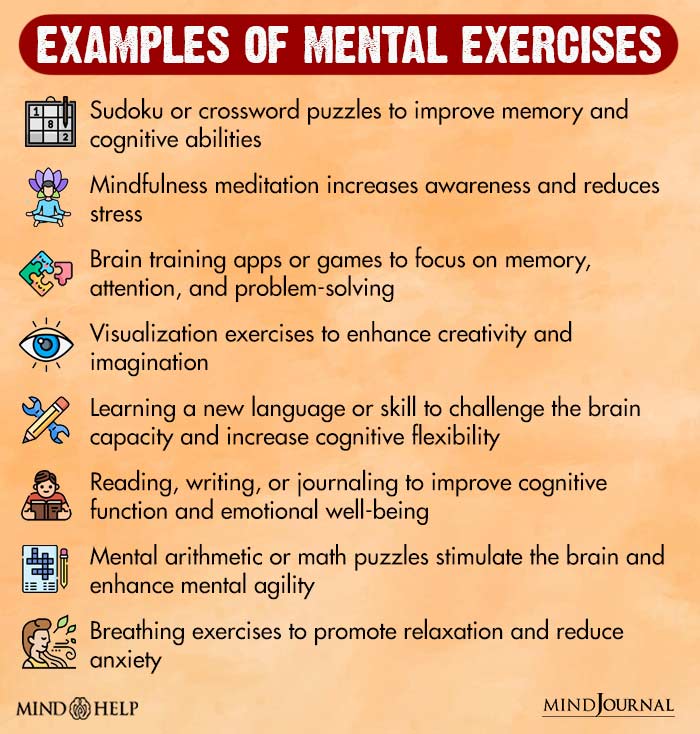
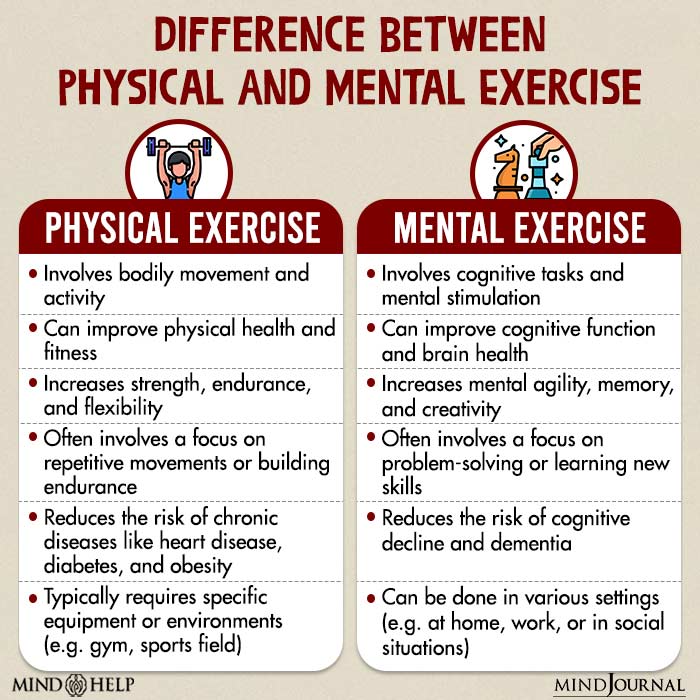
Types of Mental Exercise
There are several types [mfn] Sharma, A., Madaan, V., & Petty, F. D. (2006). Exercise for mental health. Primary care companion to the Journal of clinical psychiatry, 8(2), 106. https://doi.org/10.4088/pcc.v08n0208a [/mfn] of mental exercises that one can engage in to stimulate his or her brain. Here are some examples:
1. Reading
Reading helps improve vocabulary, concentration, and cognitive function by requiring focus and attention [mfn] Wang, Y., Guan, H., Ma, L., Luo, J., Chu, C., Hu, M., Zhao, G., Men, W., Tan, S., Gao, J. H., Qin, S., He, Y., Dong, Q., & Tao, S. (2023). Learning to read may help promote attention by increasing the volume of the left middle frontal gyrus and enhancing its connectivity to the ventral attention network. Cerebral cortex (New York, N.Y. : 1991), 33(5), 2260–2272. https://doi.org/10.1093/cercor/bhac206 [/mfn] to understand the material.
Read More About Attention Here
2. Brain Games and Puzzles
Solving puzzles such as Sudoku, crossword puzzles [mfn] Fissler, P., Küster, O. C., Laptinskaya, D., Loy, L. S., von Arnim, C. A. F., & Kolassa, I. T. (2018). Jigsaw Puzzling Taps Multiple Cognitive Abilities and Is a Potential Protective Factor for Cognitive Aging. Frontiers in aging neuroscience, 10, 299. https://doi.org/10.3389/fnagi.2018.00299 [/mfn] , and jigsaw puzzles can help improve memory, problem-solving skills, and spatial reasoning (the capacity to think about objects in three dimensions).
Read More About Memory Here
3. Learning a New Skill
Learning new skills [mfn] Leanos, S., Kurum, E., Ditta, A., Rebok, G., & Wu, R. (2018). THE IMPACT OF LEARNING MULTIPLE NEW SKILLS ON COGNITIVE DEVELOPMENT AND FUNCTIONAL INDEPENDENCE IN OLDER ADULTHOOD. Innovation in Aging, 2(Suppl 1), 1004. https://doi.org/10.1093/geroni/igy031.3708 [/mfn] or hobby, such as painting, playing an instrument, or speaking a new language, can be recommended as mental exercises for depression and anxiety as this help to improve cognitive function.
Read More About Learning Here
4. Meditation and Yoga
Practicing meditation or yoga can be the best mental exercise for mental health as it helps reduce stress, improve focus and concentration, and boost overall mental health.
Read More About Meditation Here
Importance of Mental Exercise for Mental Health
Mental exercise is important for mental health and well-being for several reasons:
1. Brain Stimulation
Mental exercises help stimulate the brain [mfn] Fariba, K., & Gupta, V. (2021). Deep Brain Stimulation. PubMed; StatPearls Publishing. Available from: https://www.ncbi.nlm.nih.gov/books/NBK557847/ [/mfn] and keep it active, which can be beneficial for cognitive exercises and prevent cognitive decline as people grow older.
2. Stress Reduction
Mental exercises such as mindfulness, meditation, and yoga can help individuals to reduce stress by developing better-coping [mfn] Hamer, M., Endrighi, R., & Poole, L. (2012). Physical activity, stress reduction, and mood: insight into immunological mechanisms. Methods in molecular biology (Clifton, N.J.), 934, 89–102. https://doi.org/10.1007/978-1-62703-071-7_5 [/mfn] strategies, which can have a positive impact on mental health.
Read More About Mindfulness Here
3. Improved Memory
Engaging in mental exercises that challenge the brain, such as puzzles and memorization exercises, can improve memory and cognitive function [mfn] Loprinzi, P. D., Roig, M., Etnier, J. L., Tomporowski, P. D., & Voss, M. (2021). Acute and Chronic Exercise Effects on Human Memory: What We Know and Where to Go from Here. Journal of clinical medicine, 10(21), 4812. https://doi.org/10.3390/jcm10214812 [/mfn] .
Read More About Memory Here
4. Improved Mood
Regular mental exercise can improve mood [mfn] Schuch, F. B., & Vancampfort, D. (2021). Physical activity, exercise, and mental disorders: it is time to move on. Trends in psychiatry and psychotherapy, 43(3), 177–184. https://doi.org/10.47626/2237-6089-2021-0237 [/mfn] by promoting positive thoughts, feelings, and behaviors, as well as by reducing negative thoughts and emotions that contribute to the symptoms of depression and anxiety. Mental exercises can be also helpful in managing symptoms of bipolar disorder by providing individuals to better regulate their thoughts, emotions, and behaviors.
5. Increased Creativity
Mental exercises such as learning a new skill or hobby can help improve creativity and problem-solving [mfn] Chacon, J. A., & Janssen, H. (2020). Teaching Critical Thinking and Problem-Solving Skills to Healthcare Professionals. Medical science educator, 31(1), 235–239. https://doi.org/10.1007/s40670-020-01128-3 [/mfn] skills.
6. Socialization
Some mental exercises, such as socializing with others, can improve overall mental health [mfn] Tough, H., Siegrist, J., & Fekete, C. (2017). Social relationships, mental health and wellbeing in physical disability: a systematic review. BMC public health, 17(1), 414. https://doi.org/10.1186/s12889-017-4308-6 [/mfn] and well-being by providing social stimulation and reducing feelings of loneliness or isolation.
Read More About Loneliness Here
Application of Mental Exercise as a Therapy
Mental exercise can be used as a therapeutic approach in the treatment of [mfn] Pascoe, M. C., Bailey, A. P., Craike, M., Carter, T., Patten, R., Stepto, N. K., & Parker, A. G. (2020). Exercise interventions for mental disorders in young people: a scoping review. BMJ open sport & exercise medicine, 6(1), e000678. https://doi.org/10.1136/bmjsem-2019-000678 [/mfn] several mental health disorders, such as:
1. Depression
Mental exercises can be effective in reducing symptoms of depression by changing negative thought patterns and increasing self-awareness. Engaging in a regular mental workout has been shown that may also help prevent the onset or recurrence [mfn] Schuch, F. B., & Vancampfort, D. (2021). Physical activity, exercise, and mental disorders: it is time to move on. Trends in psychiatry and psychotherapy, 43(3), 177–184. https://doi.org/10.47626/2237-6089-2021-0237 [/mfn] of depression.
Read More About Depression Here
2. Bipolar Disorder
Mental exercises can help individuals with bipolar disorder by managing their mood swings [mfn] Culpepper L. (2014). The diagnosis and treatment of bipolar disorder: decision-making in primary care. The primary care companion for CNS disorders, 16(3), PCC.13r01609. https://doi.org/10.4088/PCC.13r01609 [/mfn] and also reducing the frequency and severity of manic and depressive episodes.
Read More About Bipolar Disorder Here
3. Anxiety
Mental exercises can help individuals manage their anxious thoughts [mfn] Kandola, A., & Stubbs, B. (2020). Exercise and Anxiety. Advances in experimental medicine and biology, 1228, 345–352. https://doi.org/10.1007/978-981-15-1792-1_23 [/mfn] and emotions by reducing stress, increasing self-awareness and mindfulness, and improving coping strategies.
Read More About Anxiety Here
4. Eating Disorders
Mental exercises, such as daily meditation or writing in a journal, can help individuals with eating disorders [mfn] Martenstyn, J. A., Touyz, S., & Maguire, S. (2021). Treatment of compulsive exercise in eating disorders and muscle dysmorphia: protocol for a systematic review. Journal of eating disorders, 9(1), 19. https://doi.org/10.1186/s40337-021-00375-y [/mfn] improve their body image, manage their thoughts and emotions related to food and weight, and reduce disordered eating behaviors.
Read More About Eating Disorders Here
5. Substance Abuse
Mental exercises can help individuals with substance use [mfn] Zhang, L., & Yuan, T. F. (2019). Exercise and substance abuse. International review of neurobiology, 147, 269–280. https://doi.org/10.1016/bs.irn.2019.07.007 [/mfn] disorders overcome cravings for addiction and maintain general sobriety.
Benefits of Mental Exercises
Mental exercises can offer a wide range [mfn] Raglin J. S. (1990). Exercise and mental health. Beneficial and detrimental effects. Sports medicine (Auckland, N.Z.), 9(6), 323–329. https://doi.org/10.2165/00007256-199009060-00001 [/mfn] of benefits for overall cognitive exercise, which are:
- Mental exercises promote better sleep [mfn] Dolezal, B. A., Neufeld, E. V., Boland, D. M., Martin, J. L., & Cooper, C. B. (2017). Interrelationship between Sleep and Exercise: A Systematic Review. Advances in preventive medicine, 2017, 1364387. https://doi.org/10.1155/2017/1364387 [/mfn] .
- Boost self-esteem [mfn] Ekeland, E., Heian, F., Hagen, K. B., Abbott, J., & Nordheim, L. (2004). Exercise to improve self-esteem in children and young people. The Cochrane database of systematic reviews, (1), CD003683. https://doi.org/10.1002/14651858.CD003683.pub2 [/mfn] and confidence.
- Increase the ability to cope with challenging situations.
- Reduces risk of cognitive decline and dementia in later life.
- Increases productivity and focus in daily activities.
- Mental exercise can be done anywhere and anytime, without requiring special equipment or facilities.
- It is often cost-friendly, making it accessible to a wide range of people regardless of their financial resources.
Read More About Self-Esteem Here
Limitations of Mental Exercise
While mental training exercises have benefits, there are also some limitations [mfn] Firth, J., Rosenbaum, S., Stubbs, B., Gorczynski, P., Yung, A. R., & Vancampfort, D. (2016). Motivating factors and barriers towards exercise in severe mental illness: a systematic review and meta-analysis. Psychological medicine, 46(14), 2869–2881. https://doi.org/10.1017/S0033291716001732 [/mfn] to consider. Such as:
- Mental exercise is not a substitute for professional medical or psychiatric care for severe or chronic mental health disorders.
- Mental exercise may not be effective for everyone, and some individuals may find it difficult to engage in or sustain mental exercise routines.
- Mental exercise may not fully prevent or treat cognitive decline or dementia in predisposed individuals.
- Mental exercise is not a replacement for physical exercise or a healthy lifestyle, which are also essential for overall well-being.
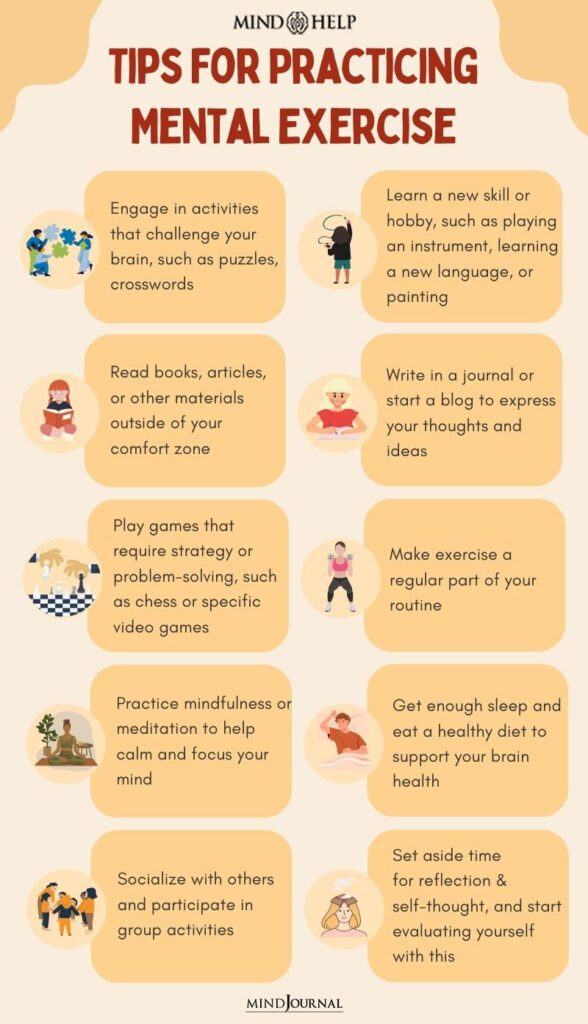
Takeaway
Mental exercise refers to the mental workout that challenges the brain through activities like puzzles, games, and mindfulness meditation. It can improve cognitive function, reduce stress and anxiety, boost mood, and increase creativity and problem-solving skills.
While mental training exercises have benefits, these may not be a substitute for professional medical or psychiatric care and may not work positively for everyone. It may also require specific skills and not be accessible to all.
At A Glance
- Mental exercise challenges the brain and includes activities such as puzzles, games, and learning a new skill.
- Mental exercises can be effective in managing and gaining control of the symptoms of anxiety and depression.
- Mental exercises for bipolar disorder, such as meditation, may be helpful in managing symptoms of the condition.
- The benefits of mind exercise for mental health include improved cognitive function, reduced stress, and increased creativity.
- Mental exercise may not be a replacement for professional medical or psychiatric care in treating severe or chronic mental health disorders.
Frequently Asked Questions (FAQs)
1. What is good mental fitness?
Good mental fitness refers to the state of having a healthy and resilient mind that can effectively cope with the daily stresses and challenges of life. It involves being able to maintain positive mental well-being, emotional stability, and cognitive function, even in the face of adversity.
2. Do mental exercises work?
Mental exercises can be effective in improving cognitive function and overall mental fitness. Just like physical exercise strengthens and tones our muscles, regular mental exercises can help to improve brain function, increase neural connections, and enhance cognitive abilities such as memory, attention, and problem-solving.
3. What is the best exercise for my brain?
The best exercise for one’s brain depends on an individual’s interests and preferences. However, engaging in activities with multiple senses, and involving learning new skills or concepts are particularly beneficial for cognitive functions.
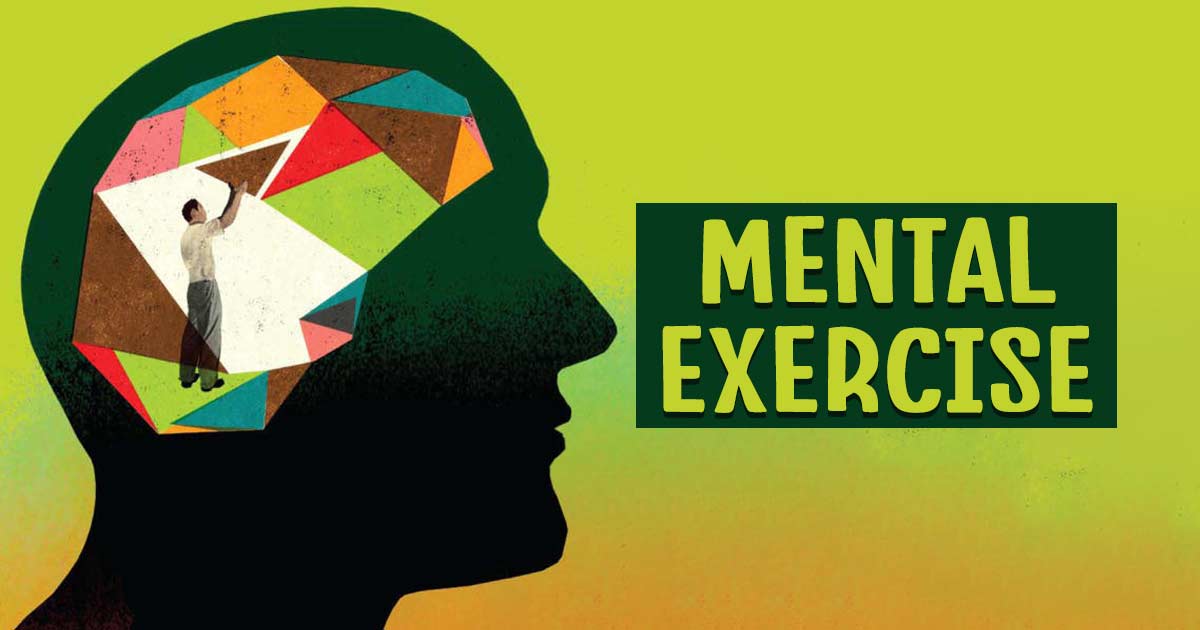

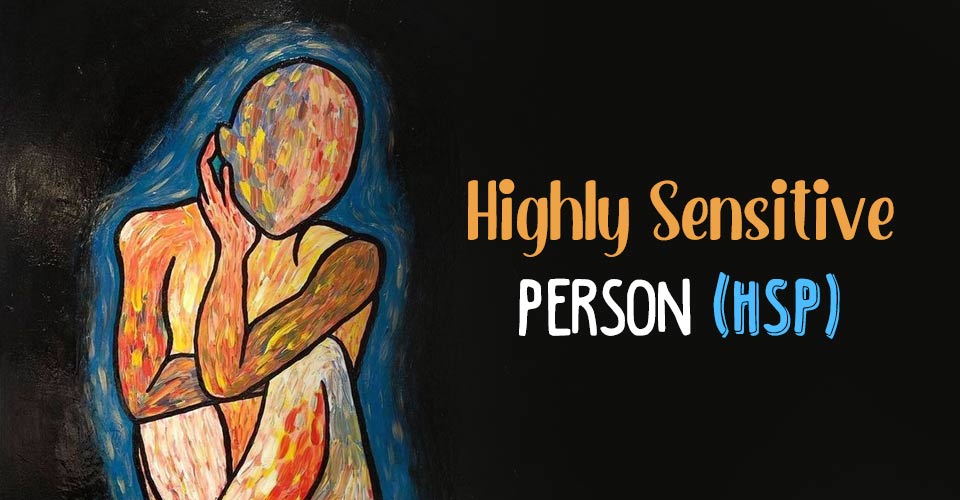

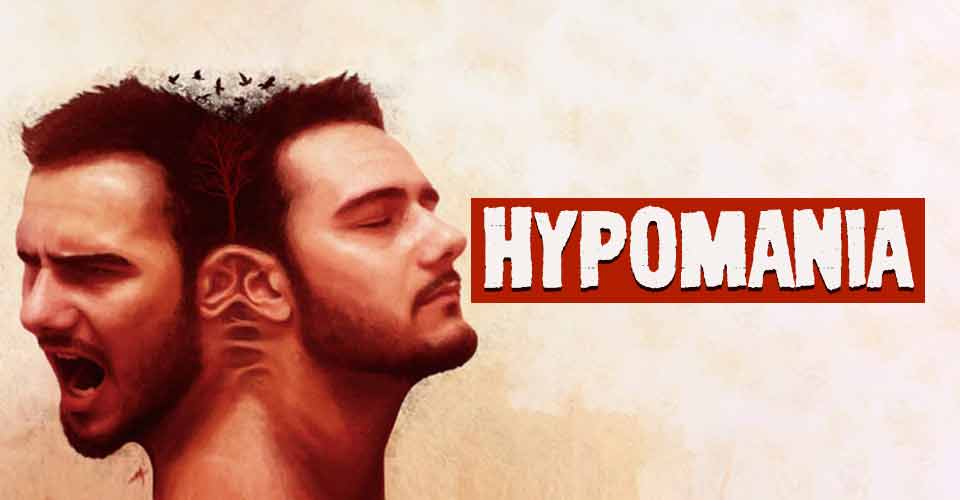



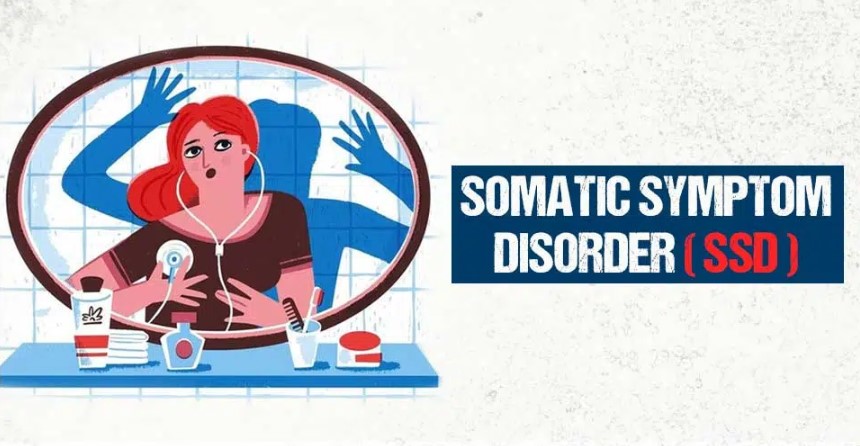

Leave a Reply